- Home
- Sarah Hall
Burntcoat Page 6
Burntcoat Read online
Page 6
Halfway through the project I started telling Naomi,
I need a wheel.
Why?
It’s just extremely important. It has to be old.
I pestered until she agreed to help. There were some ancient iron-rimmed cartwheels attached to the fence of a farm nearby, a kind of defunct agricultural gallery. Naomi disliked the farmer. His face was boiled red and angry, his wife tremored and took Valium, there were regular altercations about our shared gateway. We drove the car with the lights off in the eleven o’clock twilight, crept along the track and stole a cartwheel. We rolled it to the car and lifted it in. I kept trying to hug my mother but she told me to hurry; she seemed confused about what to do and got into the passenger seat. I drove us back across the moor, thrilled, the accelerator pressed too hard for the low gear.
Go into third, Edith.
I’m not allowed.
Third!
It shouldn’t have mattered how imperfect the construction was. But it did matter. I reassembled it three times, scaled it to the picture. I finally made a show of unveiling it, leading Naomi down the garden. The ship was cross-rigged, the mast and beams roped. The old white sheet drooped but looked authentic. In her inanimate way, Naomi was astonished. Her face slowly adjusted to surprise, her eyes brightened. I was her shoulder-height. The muscles below my denim cut-offs were long and lean, and she kept my hair cropped short. She stepped back and looked at me as if realising I was far beyond domestic keep.
Edith. You’ve made an actual ship.
Naomi was used to my inventions and experiments, but an eighteen-foot toy was something else. She walked around it, looking at the details.
Did anyone help you? she asked.
The question annoyed me, but I bit my lip.
No.
You did it. By yourself.
Then the dial clicked.
Oh, it’s fantastic! she cried. Just fantastic! Wait here.
She ran through the garden, back inside the cottage, came out again carrying a bottle of old red wine and two mugs. She poured a measure for each of us, recorked the neck and handed it to me.
OK, she said. Launch her. Smash this on the front. Ready?
I threw the bottle at the side of the ship and it clonked off into the grass, unbroken.
Harder!
I hurled it and this time the glass shattered, leaving a dripping red wound on the planks and red splashes on my bare legs.
Now name her. She has to be a she, Naomi said.
OK! I name you – the Cheryl Bone.
There was a pause, and then Naomi laughed, unprompted; she understood the joke. Excitement felt like a pain in my ribs and round my heart.
Yes, she said, yes, our safe ship, Cheryl.
We drank the musty wine, sitting on the stern behind the stolen wheel, our arms stuck together, the terrible flies crawling up and into our hair. Naomi smelled of Nivea and oniony perspiration. Her face had recomposed itself – placid as a tarn. I felt light-headed from the alcohol. There were treatments my mother had been offered, antidepressants, hypnosis. She’d undergone psychotherapy, electric shocks. For four years, I had not heard her laugh or shout or cry.
At the end of the summer my period arrived, too heavy for the thin little pads. I hated the brown-stained pants on the washing line, the invasive ache and hormones. I squabbled with Naomi, called her names, tested out all kinds of bad feelings and tried to get a reaction.
If your stupid brain explodes I’ll be fine, Mother.
She would stare at me and leave the room. I’d run outside and sit in the ship, sulking. Then, when I went back to school, she started her last story – The Reddening – which would pay off the mortgage and prove, despite everything, she could still write. In it a girl wakes one morning to find her bed covered in large, blood-eyed insects. They are in her vest and crawling over her legs. Orange-veined wings and bodies like black brooches. They have hatched from the ground after incubating for thirteen years – they’re as old as the girl, though she doesn’t know it. They fill the sky with dark clouds, invading homes, dementing people, destroying new crops. She cannot escape them. The girl tries packing them in pots and pans and boxes; they crawl out from under lids. They sing in the trees, play their tymbals all night. Finally she steals a car, drives though the swarm and out of town. The creatures gather on the windscreen, blinding her. She crashes the car, hides under her coat on the back seat. When she wakes, the plague is gone. The sky is clear. In the ground, in the roots of plants, are soft new eggs.
That book absolutely terrified me, Karolina said, sipping her tea from one of Naomi’s fat pottery mugs. So sinister – their red eyes. And rubbing their abdomens in that creepy way. Such a brilliant metaphor, isn’t it, for periodical and sexual threat. In the film, no, they didn’t quite manage it. Her vision was completely unforgiving.
It was disquieting to hear of such an accomplished woman, unknown to me, yet closer to me than anyone. It was moving. Karolina smiled and glanced at the window. The sedge of the fell grass looked very bright, uplit.
What happened to the Cheryl Bone? Is it still here?
We had a ceremonial burning when I left for art school.
Ah, wonderful. Il faut bien que jeunesse se passe. May I see the garden?
Before the taxi arrived to take her to the station, Karolina gave me a bound copy of Naomi’s most successful novel, its leather box stitched and rucked, belted delicately with rivets – an item that looked as if it had come from the Florentine Scuola.
This was at the offices. I believe you should have it.
She kissed me goodbye and gave me her number.
Let’s stay in touch, Edith. I am looking forward to whatever you make.
The next day, I walked up to the waterfalls. I swam, though the water was bone-shattering and I was no longer impervious. Naomi’s ashes blew across the valley like lint and disappeared into low cloud. I thought about the desiccated charcoal in the bags in Shun’s workshop, tried to pretend I was not scared, by loneness, my inheritance. I did not contact my father. He had another family; he was a stranger. I’d been raised, capably and neglectfully, by a borrowed woman and her shadow. I lay on Naomi’s bed in the empty cottage, comforted by the hollow in her pillow, my face soaked. It was the beginning of grief, for every version of her.
Something came together over the following years. I took every opportunity, corporate money I would later regret, met with arts officers and engineers; I hired industrial spaces, kilns, and I salvaged lumber, trying Shun’s techniques. We hadn’t completed the residency, and I was a wildcard, could experiment, innovate. I could achieve a perfect finish, those suggestive, burnished rivers, and I liked too an unfinished, immolated look. The pieces found recognition. After an exhibition in the Royal Academy, the press picked up on the work, its anomalies and size. The materials and methods suggested an artist either in the vanguard or in crisis. I called Karolina, after which our association was understood.
The designs for Hecky were produced rapidly, in consultation with Sean at Truss Gap. Naomi had been dead three years; her cottage was now a place I would go to plan and think. Looking back, the remit seems impossibly dream-like – an old-style capital spend, the creative allocation of big money, backed by a patron with private land and political heft. They wanted a statement piece by a radical new artist, a landmark on the map. I’d made a contact in the Woodland Trust and arranged the purchase of storm-blown heartwoods from the Caledonian Forest, enormous Scots pine and spruce, protected, listed individually and by century. Hecky’s body would be more solid than anything I’d ever worked with.
The trunks arrived on a flatbed at the hired yard and I could hardly believe the girth, the thickness of bark and the heavy shag of remaining foliage. The men in the warehouse next door pinched their rollies to their lips and shook their heads. An extensive health-and-safety check had been carried out, but the project looked like madness. Sean could see exactly the issues, and their cures; he knew how to support the p
iece, where to anchor it. The site was open, aproned all around by sky and weather, before the Pennine ascent. There were a million passing cars. He’d calculated mean wind speed, average gusts and catch. He’d even factored the measurements of the Helm Wind, reversed, which never blew from the west.
Nice bit of science fiction, I’m sure it’ll help.
Thanks. Maybe give her little tyrannosaurus arms and make my job easier, he joked.
Internal steel poles and a foundation of PFC. Sean had laid marble piers and concrete floors; he’d regenerated and dressed the remotest landscapes, worked in barns and factories with huge water jets and saws. We could prove she was sturdy and safe. Mechanics was not usually the problem, anyway, Sean maintained, finance was – budgets had a way of unstitching, and large works easily stalled. I liked his solutions, his adjustments. He respected every material he worked with, understood their relationships. The casting of brutalist concrete was possible only because of joinery, its brief exoskeleton. He would dig up, label, then replant all the existing gorse on the site.
As we waited in the yard for the convoy of timber, he turned to me.
Do you know how the Cyclone had the steepest drop of any wooden coaster when it was built?
No, I said.
Neither do I. They winged it.
Is that supposed to be funny?
Is what it is. You know the water tables are shifting. She may of course sink.
Right, you’re giving me indigestion now.
Hold fast, here they come.
The trucks rumbled in.
I know it. She is the masterwork. A half-burnt assemblage lofting high as a church tower, containing all the unrealistic belligerence and boldness of early ambition. The upper planks of beech were steamed pink, bent and hooped to extraordinary angles, the lower trellis strengthened by charring. She rises above the yellow furze as if from a pyre, hair streaming on the updraft, her back arcing. Welcome North.
Now they are used to her, the low flaccid breasts, the hole between her legs, and sawn gash in her face that seems to scream assent or blow the fire. She’s on postcards, aerially shot for local news credits. I’ve said countless times, she made herself, she stepped out from behind the summits, or rode the lava up. It’s true there was a sense of the automatic when I drew her, and that for two years I was in service. It’s true too that she was measured, weighed, calculated, again and again, gravitationally, by the millimetre, her keel, her travel, her metrics.
The complaints were immediate and made international news. She was a spectacle, too hazardous to traffic, ugly, indecent – the scorched nipple and obvious vagina. She defined the region fatally. Lady McKenzie defended the piece, unequivocally, chastising prime-time presenters when asked if Hecky would endure or was a folly.
Jonathan, Jonathan. Isn’t it time we moved on from all those little white stone cocks. Hurrah for Hecky.
What Ingrid McKenzie believed in was the artistic offence that becomes iconic.
I hadn’t known the Scotch Witch was in contention for any award until Karolina called with the news.
Bien joué, darling, you’re on the Galeworth list.
Suddenly, there were interviews, documentary requests, dinners and endless fuss. The ceremony itself was excruciating. I had not, I was not, expected to win. When I look at photographs of that evening in the Greenhall, Sean is sitting uncomfortably next to Jonah in a tux. There’s a strange downcast creature in a yellow boilersuit dress, doggishly hairstyled, a Japanese tattoo on the shaved strip of bone above her ear. She is so lean she looks armoured. Only Karolina fits – her black hair swept up, an immaculate spine in the backless dress. As soon as the speeches were done, we escaped out the back of the building, with a waiter Jonah had invited, and disappeared into the Underground.
Treen meets Totem.
The New Colossus of British Folk Art.
Karolina was scathing about the profiles.
Folk art? This insufferable boys’ club. They can never say a woman is exceptional, better than them.
Soon everything began to feel uncontrollable. I checked my account the week after the ceremony and the figure was stupefying, impossible – I stood at the bank, dumbly staring at the screen while the machine beeped for a decision, then ejected my card.
Do you need help? the man behind me in the queue asked sharply.
Yes, I said.
I reinserted the card, withdrew the maximum daily amount, handed him a stack of notes and walked away.
I was being told who I was but had no sense of it myself. Every time I returned north from some event, and after every interview, I was less sure how I could create. I’d always worked. I worked despite everything difficult, because of difficulty. Now, there was so much money, and opportunity, but for the first time I stopped making.
I walked the city looking for somewhere to hide; walked the riverside, past boat sheds, the old breweries and papermakers. The wicket door of Burntcoat was standing open and an agent was mounting a sign. I asked if I could go in and look. Probate had just been cleared, the family wanted rid of the place quickly, he said. It felt ridiculous to buy such a building, to take on industrial space. At the auction, I was one of two bidders – the other folded almost immediately and wished me luck with the albatross.
I collected the keys, camped in a tent downstairs, on the soft, shit-covered floor. I was stunned by my own stupidity and lay sleeplessly, listening to the pigeons purring in the walls and the plasterwork raining down.
Sometimes it’s easier to commit to bad trajectory. There’s momentum if not logic. I got rid of my phone, didn’t pick up messages from friends or Karolina. In an outbuilding I found an old wooden canoe and every night paddled down to The Anchorman, mooring at the garden railing. The bar was owned by an old schoolmate – Kendra. She remembered me as the bruised-kneed kid I’d been, not the landed artist, and teased me as if the intervening years weren’t quite to be believed.
Didn’t feel like joining the new century, then, or is this how eccentrics are supposed to travel? I don’t have river parking permits.
She was kind, could see something faltering in me. We sat and drank after her shifts, laughing like teenagers, while her husband cleared the glasses and told us to get a grip.
How’s the shag-shed, she would ask. I know you’re a country mouse but there used to be insane parties in that building when I first moved here. Total STD hotspot.
I stayed late into the evening, talking to people in the bar, trying to mask myself, be anonymous. There was dull, pointless sex, like the after-hours business of alley cats. Sometimes Kendra would walk me home, or her husband Nick would drive me, making sure I went in the door and shut it behind me. Sometimes I would paddle back upriver in the darkness, half-cut, the current tugging against the canoe, blind objects slipping past in the water and knocking against the side like skulls.
One night I slipped on the dock and was pulled from the river by passers-by. The memory’s vague: swallowing filthy water, a paramedic pumping my chest. Whisky and vomit. I don’t know if it was meant or careless. I spent the night in hospital, was given precautionary antibiotics. Every rib ached. There were reports in the press. One journalist tracked me to the building, lingered a few days, approaching when I exited and trying to get me to talk, extract a confession, maybe. The piece he wrote was nasty and researched; I was a fraud, a madwoman’s daughter. He cited Kokoschka, compared me not to the artist of giant scale and genius but to the tragic doll, the fake wife. I began saying stupid things to friends, saying I would give up, retrain.
Jonah arrived at Burntcoat after I’d called him drunk and told him the little blue boat of my soul had capsized.
Do you remember what other nonsense you said to me, jou malkop? he demanded. He took me by the shoulders and shook me, then threw his bag into a corner and looked around.
I’m going to squat in your palace awhile, princess. Capeesh? Where’s the latrine?
The first day he got up early, coughing, cursing. I
made tea on the camp stove and Jonah began to shovel piles of bird shit from the corners. There were calcified oyster shells and crabs’ legs, pats of mystery compost, ledgers we couldn’t decipher in the cupboards. He was between gigs, he said, low on funds, and needed something to keep him out of trouble; maybe he’d photograph the renovation, me, teach himself to plumb and parquet.
Just like the old days, he said. Except I’m going bald and you’re the next Rodin, apparently.
We’d got on well together in the collective after college; Jonah was enormously talented, full of ideas, and usually lovelorn, too distracted by beauty, he said – there was always a tragic affair being conducted. We both knew he was shoring me up, that I’d touched a nerve. His father was a suicide, had shot himself in the stomach with his duty gun – the maid had found him moments before Jonah arrived back from school; she’d covered his torso, called for medical assistance, but hadn’t managed to clean the wall. Jonah understood shame, anger, the insidious repetitions of example; he’d told the story to everyone.
The old bastard was still alive when I came in; he asked me if I’d got homework to do.
He helped create Burntcoat. He spoke to the glaziers – assured them the vast window measurements were correct, hefted a reclaimed bath up the stairs with me, and the cast-iron stove that seemed heavier than a planet. We set our sore backs against the wall.

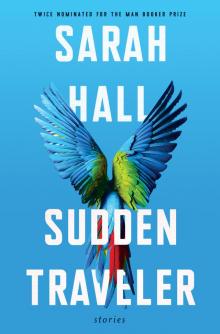 Sudden Traveler
Sudden Traveler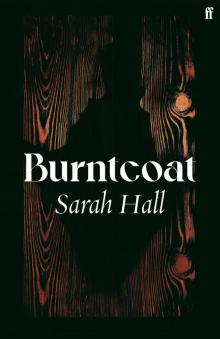 Burntcoat
Burntcoat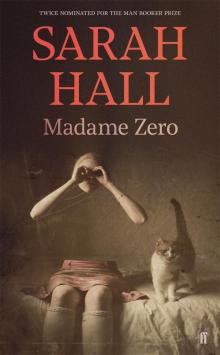 Madame Zero
Madame Zero Mrs Fox
Mrs Fox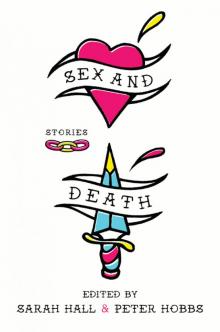 Sex and Death
Sex and Death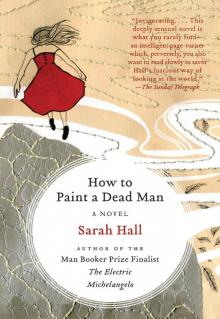 How to Paint a Dead Man
How to Paint a Dead Man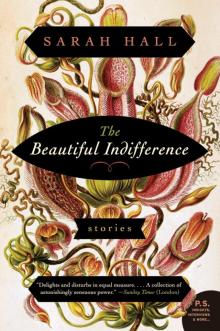 The Beautiful Indifference
The Beautiful Indifference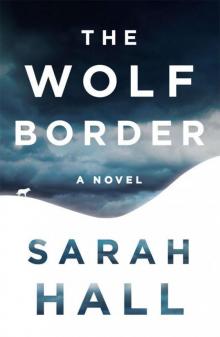 The Wolf Border
The Wolf Border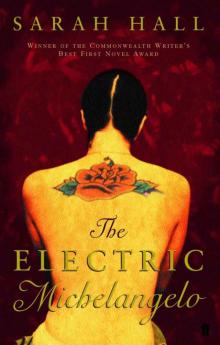 The Electric Michelangelo
The Electric Michelangelo